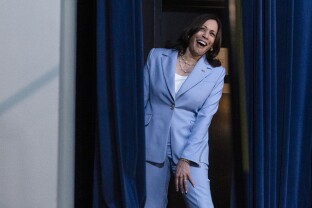A recent invite-only Zoom showcased the new opportunity Democrats suddenly have with Vice President Kamala Harris and how easily they can squander it if they’re not careful. The challenge, simply put, is to turn coconut tree emojis into votes.
Meeting that challenge requires abandoning traditional political messaging and giving up much of the careful control that defines modern political communications. Priorities USA, the Democratic powerhouse independent expenditure group that hosted the call, says it has been planning for this moment for years. Harris’ arrival lets Priorities fully implement its plan for the first time. If everything works out, Priorities will turn people like Meredith Judd into key players in the sprint to November.
Five days before she logged onto the Priorities Zoom, Judd was another young Democratic-leaning voter unenthused by President Joe Biden and his campaign. The problem had been plaguing Democrats all cycle — the president’s age and the war on Gaza had quieted the young digital army that had helped carry Democrats to victory in 2020. Losing Judd’s attention was especially poignant, if par for the course. She has participated in politics for years, prides herself on following the news and really, really does not like former President Donald Trump. But on that Sunday, she was sharing in a general feeling that there was no point in getting involved.
